Xi's remarks at int'l meetings send strong signal of promoting solidarity, devel
- From containing the COVID-19 pandemic and rebooting the global economy, to forging a free and open trade environment amid rising unilateralism and protectionism, China has voiced its solid support for coordinated international efforts to tackle global threats and promote common development.
- "In my view, the principle of extensive consultation, joint contribution and shared benefits should guide our way forward," Chinese President Xi Jinping said Saturday at the Group of 20 (G20) Leaders' Summit via video link. "We should uphold multilateralism, pursue openness and inclusiveness, promote mutually beneficial cooperation and keep pace with the times."
- The Chinese leader believes that the extensive appeal of building a community with a shared future for mankind is the right way for humanity to overcome common challenges and build a more prosperous and better world.
Global leaders have convened in a series of virtual meetings this month to address the most pressing challenges facing mankind.
From containing the COVID-19 pandemic and rebooting the global economy, to forging a free and open trade environment amid rising unilateralism and protectionism, China has voiced its solid support for coordinated international efforts to tackle global threats and promote common development.
"In my view, the principle of extensive consultation, joint contribution and shared benefits should guide our way forward," Chinese President Xi Jinping said Saturday at the Group of 20 (G20) Leaders' Summit via video link. "We should uphold multilateralism, pursue openness and inclusiveness, promote mutually beneficial cooperation and keep pace with the times."
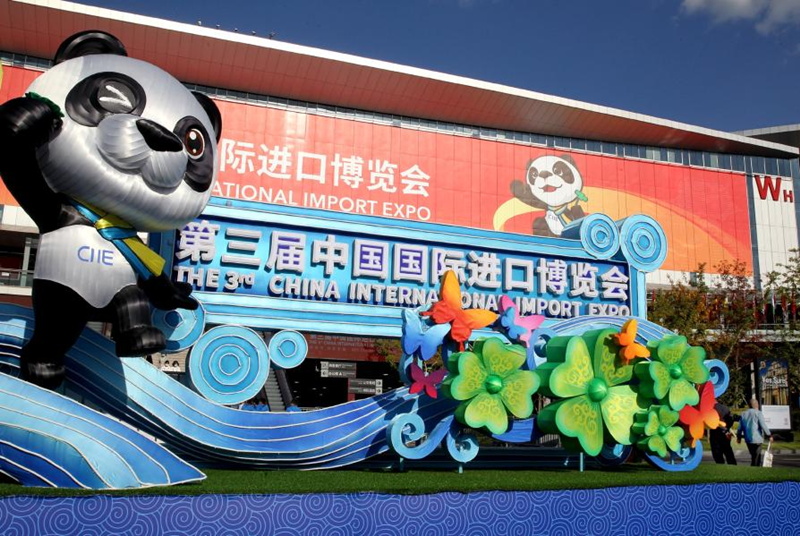
Photo taken on Nov. 3, 2020 shows Jinbao, mascot of the China International Import Expo, in east China's Shanghai. (Xinhua/Chen Fei)
Stand in solidarity
The COVID-19 pandemic, as Xi described at the 20th meeting of the Council of Heads of State of the Shanghai Cooperation Organization (SCO) early this month, has accelerated shifts in the international landscape.
Over 58 million people have contracted the virus with more than 1.3 million killed. With shrinking trade and investment as well as impeded flows of goods and personnel, the global economy is experiencing the worst recession since the Great Depression in the 1930s. Unilateralism, protectionism and acts of bullying are resurging.
"We must take up the most powerful weapon of solidarity and cooperation," Xi said, stressing the need to build a community of health for all, a community of security for all, a community of development for all and a community of cultural exchanges for all.
Since the onset of the pandemic, China has been standing side by side with the rest of the world in the fight against the coronavirus.
From sending expert teams and donating essential medical supplies, to jointly building test labs and sharing its experience in containing the virus, China has never hesitated to offer a helping hand to anyone in need.
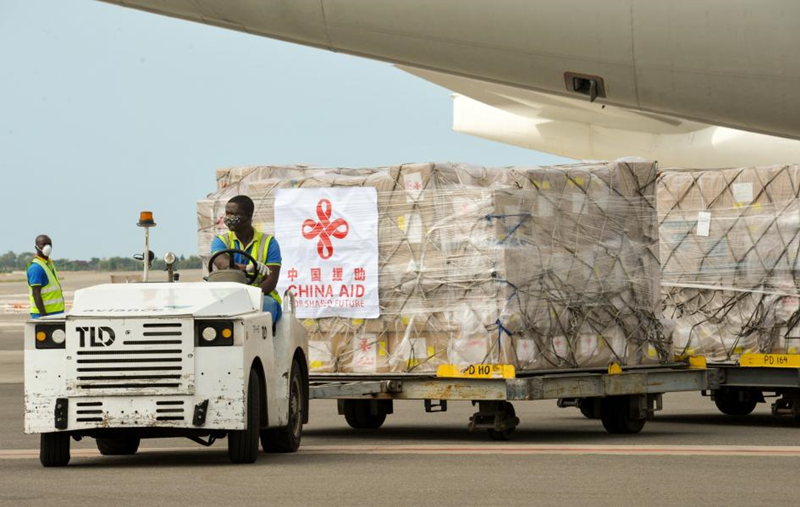
A staff member unloads Chinese medical supplies from an airplane at the Kotota International Airport in Accra, Ghana, April 6, 2020. (Xinhua/Xu Zheng)
Beijing has also been supporting the World Health Organization in facilitating global cooperation against COVID-19. In early October, China officially joined COVAX, an international initiative aimed at ensuring equitable access to COVID-19 vaccines across the world, to fulfill its commitment to make Chinese vaccines a global public good.
"Our fight over the past year proves that as long as we stand in unity and follow science, we can control the spread of the virus and offset its impact," Xi said at the 12th BRICS summit that also gathered leaders from Russia, India, South Africa and Brazil.
Ali el-Hefny, Egypt's former ambassador to China and former deputy foreign minister, said China has set an example that illustrates the true meaning of global solidarity.
"It shows that the Asian country doesn't only consider its internal situation ... but also cares for the people of the whole world," he said.
Aleksey Maslov, acting director of the Institute of Far Eastern Studies in Russia, said the Chinese leader stressed a very important thing -- joint efforts to fight not just the coronavirus, but also different kinds of challenges that face not only China, but also the entire human race.
In Maslov's eyes, Xi's remarks, with a global vision, are about how "we can cooperate in the future."
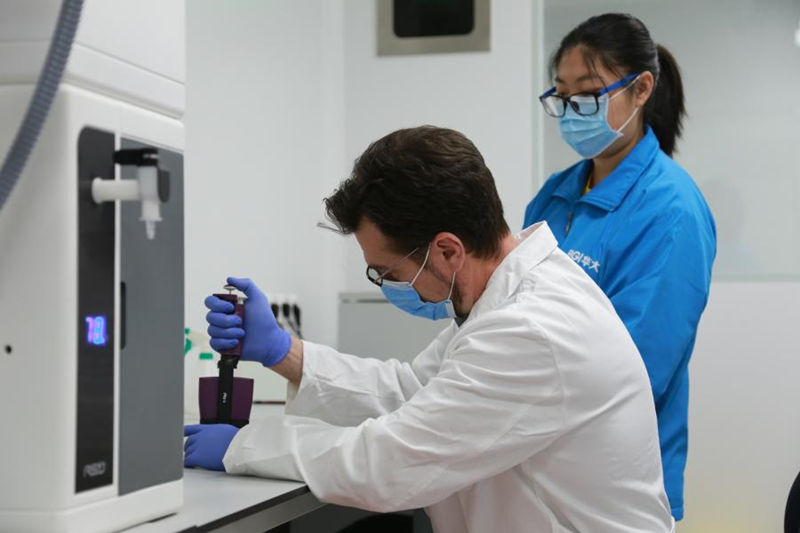
A Chinese expert (R) from Chinese biotech company BGI Group provides training for a Serbian expert at the Fire Eye laboratory in Belgrade, Serbia, April 20, 2020. (Xinhua/Shi Zhongyu)
Multilateral cooperation
As the world is staggering to walk out of the pandemic-induced recession, a COVID-19 resurgence worldwide threatens to reverse global economic rebounds.
The International Monetary Fund (IMF) has forecasted that the world economy will shrink by 4.4 percent this year, and emerging markets and developing countries will experience negative growth for the first time in 60 years.
"While global economic activity has picked up since June, there are signs that the recovery may be losing momentum, and the crisis is likely to leave deep, unequal scars," said the IMF in a report.
Addressing the BRICS meeting, Xi said that "History teaches us that multilateralism, equity and justice can keep war and conflict at bay, while unilateralism and power politics will inflate dispute and confrontation."
Commending Xi's appeal for upholding multilateralism, Jim O'Neill, chairman of the London-based think tank Chatham House, said safeguarding multilateralism amid the pandemic is "exceptionally important" and expressed hope that all BRICS countries can return to stronger growth after the pandemic.
Warning against the practice of using the pandemic to pursue "de-globalization" or clamor for "economic decoupling" and "parallel systems," Xi called on the international community to stand firm for building an open world economy.
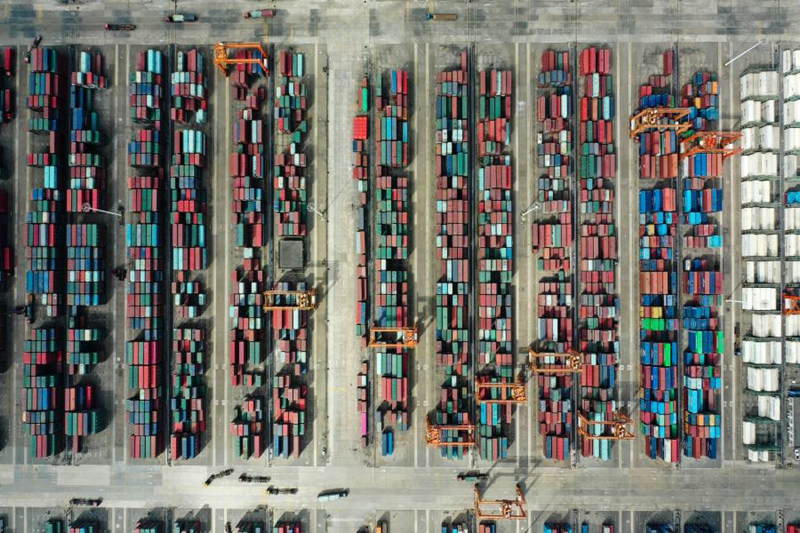
Aerial photo taken on Nov. 19, 2020 shows containers piled in the Qinzhou Port in south China's Guangxi Zhuang Autonomous Region. (Xinhua/Zhang Ailin)
China has outlined the proposals of its development blueprint for the next five years and beyond, and is expected to continuously share with the world its development opportunities to facilitate global post-pandemic recovery.
China will speed up fostering a new development pattern where domestic and foreign markets can boost each other, with the domestic market as the mainstay, and form the new institutions of a higher-level open economy.
The new development paradigm does not mean "a closed-door circulation," but "will enable China to open up wider and share more opportunities for common development with other countries," Xi stressed at the Asia-Pacific Economic Cooperation (APEC) CEO Dialogues.
At the 27th APEC Economic Leaders' Meeting, Xi said China welcomes the signing of the Regional Comprehensive Economic Partnership, and will favorably consider joining the Comprehensive and Progressive Agreement for Trans-Pacific Partnership, demonstrating China's determination to press ahead with economic integration.
Despite rising unilateralism and protectionism in some countries, "China has shown its commitment to international cooperation, openness, rules-based free trade and multilateralism which are important for global economic recovery," said Wilson Lee Flores, a columnist for the English daily The Philippine Star.
Vo Dai Luoc, former head of the Institute of World Economics and Politics under the Vietnam Academy of Social Sciences, said he was impressed by "China's strong commitment to opening-up, trade liberalization as well as global integration," which will boost confidence in global recovery and development.
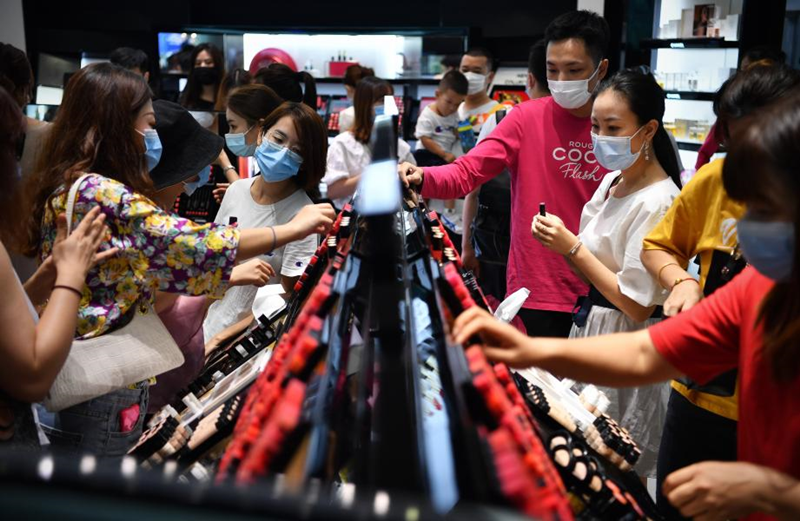
Tourists shop at a duty-free shopping mall in Sanya City, south China's Hainan Province, Oct. 5, 2020. (Xinhua/Guo Cheng)
Strive for a shared future
With positive results from clinical trials of several vaccines, the world has seen a ray of hope for the pandemic's end. However, this could hardly be the last pandemic, nor the last global health emergency. There is also no easy way out for other challenges facing humankind such as poverty and climate change.
"What is going on with the world?" "What shall we do about it?" -- These are the questions awaiting answers from the people of our times.
Elaborating on his answers to these questions, Xi said at the third Paris Peace Forum that "Global threats and challenges require global responses."
"This pandemic once again shows that the interests of all countries are closely interwoven and that humankind shares a common stake. Indeed, our world is an indivisible community with a shared future," said Xi.
The Chinese leader believes that the extensive appeal of building a community with a shared future for mankind is the right way for humanity to overcome common challenges and build a more prosperous and better world.
Since the concept was first introduced to the international community in 2013, China has embarked on an arduous journey to turn the vision into reality.
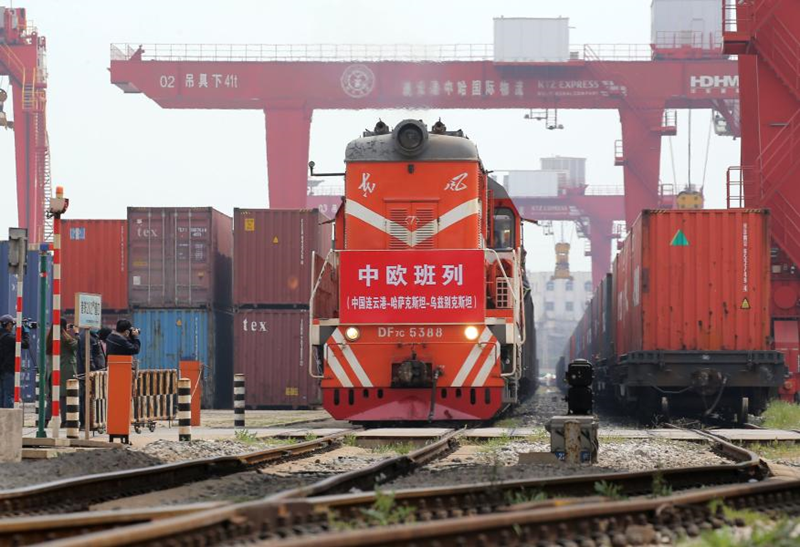
A China-Europe freight train loaded with medical supplies pulls out of a China-Kazakhstan logistics terminal in Lianyungang, east China's Jiangsu Province, April 14, 2020. (Photo by Wang Jianmin/Xinhua)
By rolling out such platforms as the Belt and Road Initiative and the China International Import Expo, honoring its commitment to tackling climate change, and fully implementing the Debt Service Suspension Initiative, China has clearly demonstrated its dedication to the vision.
"China has emerged as the torchbearer for the defense and survival of multilateralism," said Aslam Khan, a columnist of Urdu newspaper Nawa-i-Waqt in Pakistan.
China's call for building "a community with a shared future for mankind is very crucial for the reduction of poverty at the global level, sharing development and handling global devastating issues like COVID-19," Khan said.
Writing by Dong Yue; reporting by Yuan Xinfang in Moscow, Mahmoud Fouly in Cairo, Jin Jing in London, Nguyen Thi Thanh Xuan in Hanoi, Jamil Bhatti in Islamabad and Yang Ke, Yuan Mengchen in Manila (Xinhua)








